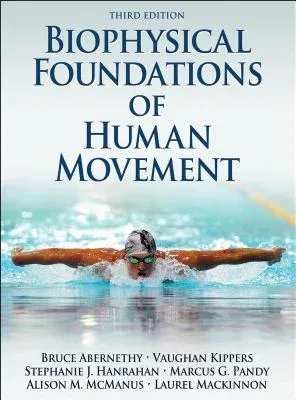Biophysical Foundations of Human Movement, Third Edition, introduces
readers to key concepts concerning the anatomical, mechanical,
physiological, neural, and psychological bases of human movement. The
text provides undergraduate students with a broad foundation for more
detailed study of the subdisciplines of human movement and for
cross-disciplinary studies. Readers will learn the multi-dimensional
changes in movement and movement potential that occur throughout the
life span as well as those changes that occur as adaptations to
training, practice, and other lifestyle factors.
This third edition includes the latest research and improved
presentation to address areas of growth and change in the fields of
human movement. The following are important updates to this edition:
- A new chapter on historical origins of human movement science provides
students with an appreciation of the development of the field as well
as its future directions.
- Content regarding exercise physiology has been reorganized to provide
more discrete coverage of key concepts in nutrition.
- A new concluding section focuses on applications in the areas of
prevention and management of chronic disease, prevention and
management of injury, and performance enhancement in sport and the
workplace, as well as the benefits of sport and exercise science to
work, sport, and everyday living.
- Ancillary materials support instructors in teaching across disciplines
as they assist students in understanding the breadth of content in
this comprehensive text.
Using a modular approach to teaching sport and exercise science,
Biophysical Foundations of Human Movement, Third Edition, offers
students a structured understanding of how the subdisciplines work
independently and in tandem. Following a general introduction to the
field of human movement studies, readers are introduced to basic
concepts, life-span changes, and adaptations arising in response to
training in each of the five major biophysical subdisciplines of human
movement. Each subdiscipline is given a brief introduction, including
the definition and historical development of the subdiscipline, the
typical issues and problems it addresses, the levels of analysis it
uses, and relevant professional training and organizations.
Multi-disciplinary and cross-disciplinary approaches to human movement
are also discussed along with contemporary applications. By studying the
integration of knowledge from a number of the biophysical
subdisciplines, students will be better prepared for advanced study and
careers reliant on the integration of knowledge from various disciplines
and perspectives.
The third edition offers tools for retaining the material, including
learning objectives and summaries in each chapter, a glossary, and lists
of web-based resources. Throughout the text, special "In Focus" features
highlight key organizations, individuals, and studies from around the
world that have contributed to the current understanding of human
movement. These features help readers appreciate the evolution of the
field so that they may better understand its direction. Students
interested in further study will find specialized texts for each of the
subdisciplines listed in the Further Reading and References section of
each chapter along with updated lists of websites.
The third edition of Biophysical FFoundations of Human Movement offers
a comprehensive introduction for students, scientists, and practitioners
involved in the many professions grounded in or related to human
movement, kinesiology, and sport and exercise science. By considering
the effect of adaptations in each of the biophysical subdisciplines of
human movement, Biophysical Foundations of Human Movement also
illustrates the important role physical activity plays in the
maintenance of health throughout the life span.

